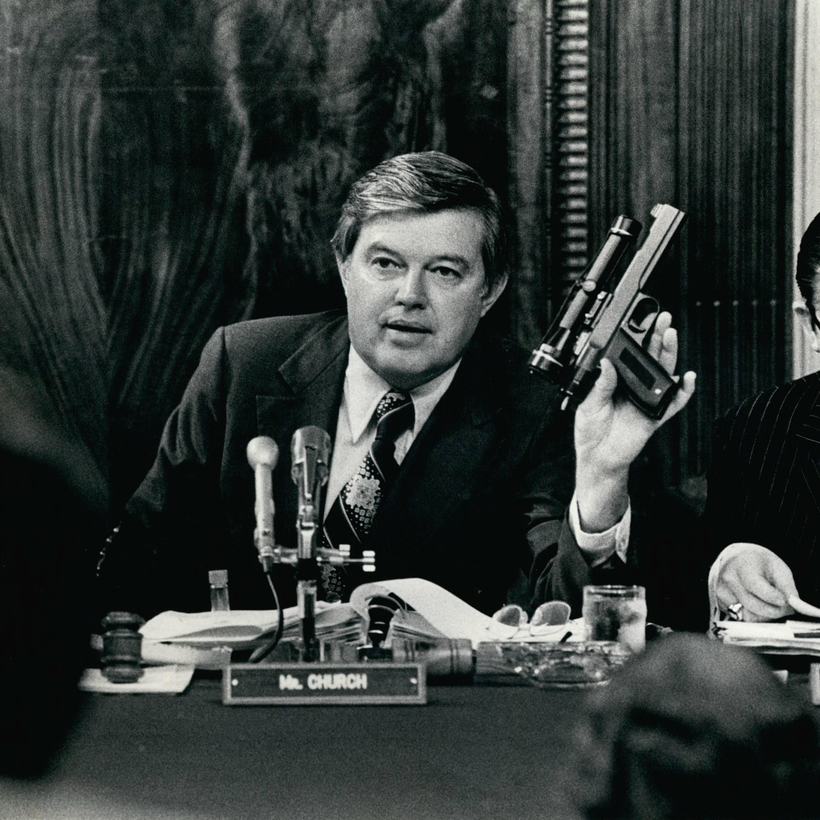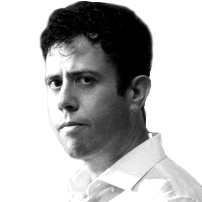Senator Frank Church, Democrat from Idaho, holding up a poison-dart gun designed by the Central Intelligence Agency for potential use in assassinations: in the pantheon of images from congressional hearings stamped upon the American consciousness, it ranks alongside those of Roy Cohn whispering into Joe McCarthy’s ear and Oliver North raising his right hand.
It was September 1975, and Church was presiding over the first open session of his Senate Select Committee to Study Government Operations with Respect to Intelligence Activities, the anodyne name of which belied the shocking facts it would reveal about the C.I.A., the F.B.I., and the N.S.A., none of which had theretofore been subject to much public scrutiny or congressional oversight. Attempting to exhume all the misdeeds committed by the nation’s vast intelligence apparatus was “like trying to air out a house that had been shuttered for 30 years,” James Risen writes in The Last Honest Man: The CIA, the FBI, the Mafia, and the Kennedys—And One Senator’s Fight to Save Democracy.
Today, as the leaders of a new congressional body aimed at investigating the “weaponization of the federal government” claim the mantle of Frank Church, it’s worth revisiting what the media dubbed the “Year of Intelligence.”
That period of inquiry was occasioned by a series of disturbing revelations of abuse and deception at the highest levels of the American government. In 1971, a group of anonymous activists broke into an F.B.I. office in Pennsylvania, where they discovered secret files detailing unlawful surveillance of anti-war groups. That same year, The New York Times published the Pentagon Papers, exposing how presidential administrations dating back to Harry Truman had lied to the American people and Congress about American involvement in Vietnam.
And in 1974, the newspaper printed an explosive front-page story by Seymour Hersh revealing portions of what some within the C.I.A. morbidly referred to as “the Family Jewels,” detailing how the agency had violated its charter by engaging in a decades-long “massive, illegal domestic intelligence operation.”
But it was a blunder by President Gerald Ford that unwittingly lit a fire under Church’s newly formed committee. In a January 1975 meeting with New York Times editors, Ford was discussing the commission he had hastily convened to investigate the nation’s intelligence agencies. Asked by executive editor Abe Rosenthal why the body was so “obviously loaded” with Establishment figures, Ford replied that it required the type of man who could keep secrets secret. Rosenthal asked Ford to elaborate on what kind of secrets he meant, and the president, demonstrating the verbal dexterity he would later show with his assertion that “there is no Soviet domination of Eastern Europe,” blurted out, “Like assassinations.”

While the committee determined that no foreign leader was actually assassinated as a direct result of what one agency official memorably termed “executive action capability,” this was not for want of trying. Between 1960 and 1965, the C.I.A., occasionally in cooperation with the Mafia, attempted to kill Fidel Castro eight times. (A desire to eliminate the wily Cuban Communist leader was not the only thing President John F. Kennedy had in common with Mob boss Sam Giancana; the committee’s report revealed that the two may also have shared a mistress.)
The agency conceived a plot to poison Congolese prime minister Patrice Lumumba, but the toxin was never administered, and Lumumba was eventually killed by a firing squad. And though the committee found that agency officials did not play direct roles in the assassinations of Dominican generalissimo Rafael Trujillo, South Vietnamese president Ngo Dinh Diem, or Chilean general René Schneider, it did determine that they “encouraged or were privy to coup plots that resulted in the deaths” of these men.
While the committee determined that no foreign leader was actually assassinated as a direct result of what one agency official memorably termed “executive action capability,” this was not for want of trying.
The details of another assassination, committed on American soil, constitute the book’s most significant claim. On the morning of September 21, 1976, a car bomb exploded in Washington, D.C., killing Orlando Letelier, who had served as foreign minister in Salvador Allende’s Socialist Chilean government prior to its 1973 overthrow by General Augusto Pinochet. According to a Church Committee staffer Risen interviewed, Letelier privately briefed the committee the year before his assassination. While he acknowledges that “it is not known whether the Pinochet regime knew that Letelier had been talking to the Church Committee,” Risen suggests that this interaction might have played a role in convincing Pinochet to order the hit. A few months before Letelier’s killing, Pinochet complained to Secretary of State Henry Kissinger that “Letelier has access to Congress.”
Curiously, Risen strains to absolve Robert Kennedy for his complicity, as his brother’s attorney general, in the surveillance of Martin Luther King Jr. According to Risen, not only did “the Kennedys [give] in to [F.B.I. director J. Edgar] Hoover’s demands to investigate King,” but Hoover may have blackmailed them into doing so. This claim, however, is at odds with the findings of Yale historian Beverly Gage, who in her acclaimed recent biography of Hoover, G-Man: J. Edgar Hoover and the Making of the American Century, writes that it was R.F.K. who “proposed something that even Hoover had not fully entertained: wiretaps … on King himself.”
The enduring legacy of Frank Church and his committee is succinctly described by Risen as “bringing the intelligence community under the rule of law.” In the wake of the committee’s report, Ford issued an executive order prohibiting political assassinations, a 10-year term was fixed for the director of the F.B.I., and permanent congressional-oversight committees were established to (at least in theory) ensure that the people’s elected representatives would keep a watchful eye on the watchers.
Risen’s admiration for Church, whom he describes as an “American Cicero” and “a radical in senatorial clothing,” inclines him to triumphalism. “Church made sure there was no permanent ‘Deep State’—a hidden and unaccountable national security hierarchy—within the American government,” he writes. This is an odd assertion for a veteran chronicler of the American national-security state to make, especially one who came under enormous legal pressure from both the Bush and Obama administrations to divulge his confidential government sources.
Risen also neglects to speculate as to what the object of his adulation would have to say about the way so many in the modern Democratic Party worship at the feet of the national-security state he devoted his career to reining in. “You take on the intelligence community, they have six ways from Sunday of getting back at you,” Democratic Senate leader Chuck Schumer ominously warned Donald Trump in 2017, effectively encouraging America’s spooks to interfere in its domestic politics. On any given day, the MSNBC greenroom could be mistaken for a convention of the Association of Former Intelligence Officers.
If the unprecedented behavior of Donald Trump turned many liberals who were once skeptical of the national-security state into its sycophants, equally ironic has been the transformation of the American right from knee-jerk defenders of that selfsame secret bureaucracy into advocates for its dismantlement.
One of the demands imposed upon Kevin McCarthy by the band of hard-right Republican holdouts to his becoming Speaker of the House was the creation of the aforementioned Select Subcommittee on the Weaponization of the Federal Government, whose chairman, Jim Jordan, fancies himself Frank Church in shirtsleeves. But whereas the Church Committee approached its subject with an open mind, its latter-day incarnation is a caricature, searching for evidence in support of its pre-determined conclusions.
The behavior of partisans on both sides dishonors the legacy of Frank Church, a man who brought Walter Mondale and Barry Goldwater together for the common purpose of reforming America’s intelligence services so that they operated within the letter of the law. Nearly half a century since his greatest achievement, we would do well to study his example—while mourning the dearth of honest men at hand to follow it.

James Kirchick is a Writer at Large for AIR MAIL and the author of Secret City: The Hidden History of Gay Washington


